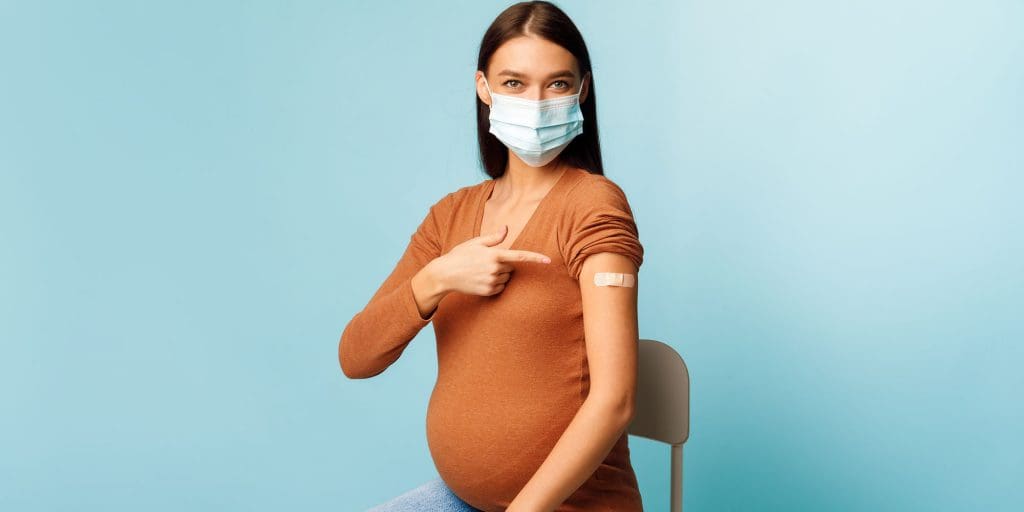Since their approval for Emergency Use Authorization (EUA) by the Food and Drug Administration (FDA) in December of 2020, both the Pfizer-BioNTech and Moderna messenger RNA (mRNA) vaccines have been administered to tens of millions of Americans. But, are covid vaccines safe for pregnant women?
mRNA Vaccines and Pregnant Women
Pregnant women were originally excluded from the early pre-EUA clinical trials of both mRNA vaccines, but recent data has suggested that the vaccine is still safe and effective for those who are pregnant or who have recently been pregnant.
Even with limited data, pregnant women were, and continue to be, urged to get vaccinated, as they are at an increased risk for a multitude of health conditions.
Women who are pregnant, or who have recently been pregnant, are at an increased risk of severe illness and death when compared with nonpregnant persons of reproductive age. Pregnant women who contract COVID-19 also have an increased risk of negative pregnancy outcomes such as premature birth.
With limited knowledge of the safety of mRNA vaccines on pregnant women, it is no surprise that wild conspiracies such as infertility and miscarriage caused by COVID-19 vaccines have surfaced.

However, organizations such as the Centers for Disease Control and Prevention (CDC) and the World Health Organization (WHO) have quelled these unsupported claims and urged all pregnant women to get vaccinated.
Currently, there is no evidence that any vaccine, including any approved COVID-19 mRNA vaccine, causes infertility in women or men.
In a recent study published in the New England Journal of Medicine, a group of scientists from the CDC’s V-safe COVID-19 Pregnancy Registry Team aimed to put the claims of COVID-19 mRNA vaccines being “unsafe” for pregnant women to rest once and for all.
From December 14, 2020, to February 28, 2021, the team examined data from the CDC’s “v-safe after vaccination health checker” (an ongoing surveillance system by the CDC to monitor any side effects after vaccination), the v-safe pregnancy registry, and the Vaccine Adverse Event Reporting System (VAERS) to understand more about the initial safety of mRNA COVID-19 vaccines in pregnant women.
In total, 35,691 women aged 16-54 years of age who identified as pregnant participated in the v-safe registry. Across the board, pain at the injection site was reported more frequently in women who identified as pregnant than those who did not identify as pregnant. Conversely, headache, chills, fever, and myalgia (muscle pain) were less common in pregnant women than in non-pregnant women.
Among the 3,958 women who were enrolled in the CDC’s v-safe pregnancy registry, 827 completed their pregnancy to full term during the length of the study. Of those women, 115 lost their pregnancy (13.9%) and 712 (86.1%) resulted in a live birth. Researchers also observed adverse neonatal outcomes, such as preterm birth (in 9.4%) and small size for gestational age (3.2%). No neonatal deaths were reported in any of the observed data.
What’s important to note is that these numbers coincide with what would otherwise be referred to as the normal rate of occurrence. This means that there are similar statistics in real life to those seen in the study. In other words, miscarriages statistically occur as often in reality as they did within the study, suggesting that the COVID-19 vaccines had no effect on the rate of miscarriages in pregnant women.
Women who know they are pregnant are at a 10-15% risk of miscarriage according to the March of Dimes, a United States-based nonprofit organization that works to improve the health of mothers and babies. Knowing this, researchers can expect to see pregnancy complications such as spontaneous abortion or miscarriage at a given rate, regardless of vaccination status. This means that the 13.9% of lost pregnancies were not directly related to an mRNA vaccine, but rather to be expected in any study observing pregnant women.
Scientists involved in the study say their preliminary results did not show any obvious links between mRNA COVID-19 vaccines but stressed that more follow-up, including on women who are vaccinated earlier in pregnancy, is needed to confidently inform both pregnant women and women who are actively trying to conceive.
If you are pregnant, or have recently been pregnant, and are unsure as to whether or not you should get vaccinated, talk with your doctor to learn more about the safety and efficacy of mRNA vaccines.
What Questions About COVID-19 Vaccines Do You Have?




